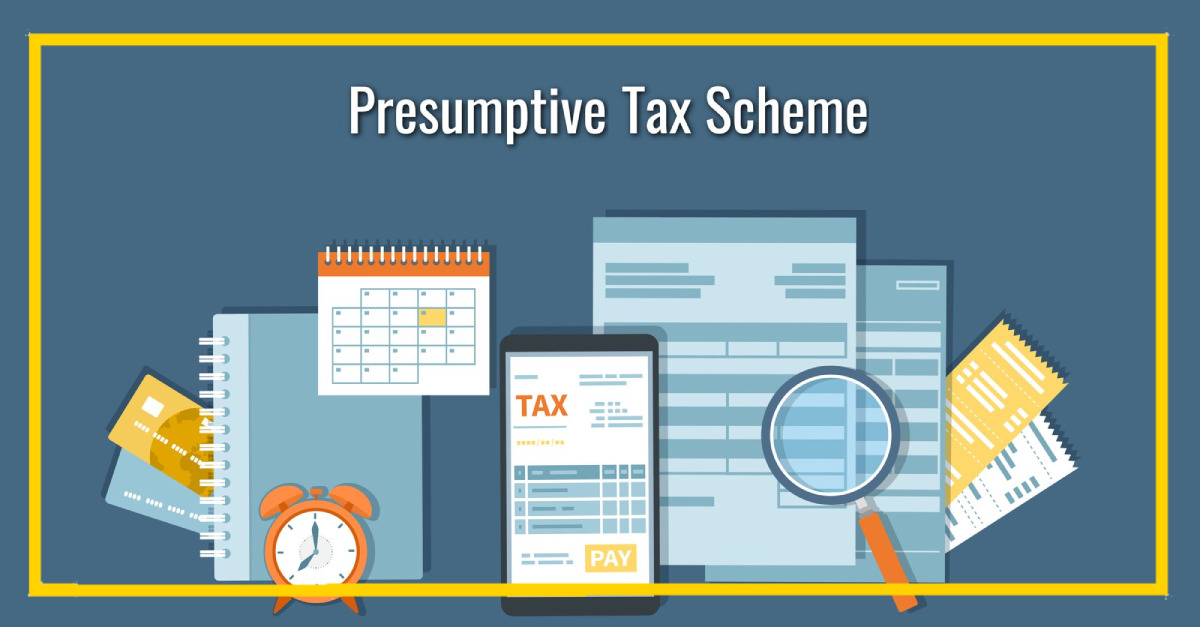Skip the hassle of tracking every expense! Learn how presumptive taxation simplifies tax filing for businesses & professionals under ₹2 crore or Rs 50 lakh income.
Presumptive taxation is an optional method that allows taxpayers to determine their taxable income based on a predetermined percentage of their gross receipts or turnover. This simplified approach is particularly advantageous for businesses and professionals who may find the regular method of accounting complex or time-consuming.

Understanding Presumptive Taxation
Presumptive taxation is a taxation method that allows taxpayers to determine their taxable income based on a predetermined percentage of their gross receipts or turnover. This simplified approach is particularly advantageous for businesses and professionals who may find the regular method of accounting complex or time-consuming.
How does it work?
Presumptive taxation takes the guesswork out of calculating your taxable income. Instead of meticulously tracking every expense, the government assumes a certain percentage of your turnover or gross receipts as your profit. This means:
- For Businesses: If your annual turnover is below Rs. 2 crore, your taxable income is presumed to be 8% of your turnover (or 6% if you embrace digital payments). Think bakeries, boutiques, or even small manufacturers – they can all join the simplified party.
- For Professionals: Doctors, lawyers, architects, and other professionals with gross receipts under Rs. 50 lakh can breathe a sigh of relief. Just declare 50% of your gross receipts as taxable income – no justifications, no audits, just straightforward compliance.
Why Choose Presumptive Taxation?
The benefits are clear:
- Simplified Accounting: Ditch the mountains of paperwork and spreadsheets! Focus on building your business or honing your skills, not deciphering tax codes.
- Compliance Breeze: Say goodbye to deadlines and audit anxieties. Presumptive taxation makes tax compliance a breeze, freeing up your time for more productive pursuits.
- Potentially Lower Tax Burden: Depending on your actual expenses, you might even enjoy a lighter tax burden compared to the traditional regime.
But wait, Are there a few Caveats?
Yes there are a few caveats such as:
- Limited Scope: Not all businesses and professions qualify. Make sure you meet the eligibility criteria before making the switch.
- No Expense Deductions: Forget claiming that fancy laptop as a business expense. Under this scheme, what you see is what you get, no deductions allowed.
- Limited Flexibility: Once you choose presumptive taxation, you’re in it for the long haul. Switching back and forth isn’t an option.
Applicability to Businesses
Small businesses, including those engaged in trading, manufacturing, or providing services, often benefit from presumptive IT. Section 44AD of the Income Tax Act, 1961, offers eligible businesses the option to declare income at a prescribed rate, relieving them from the burden of maintaining detailed books of accounts.
Professionals Covered under Section 44ADA
For professionals such as doctors, lawyers, architects, and others, Section 44ADA provides a similar presumptive taxation scheme. Professionals can declare income at a prescribed percentage of their gross receipts, simplifying the tax calculation process and reducing the compliance burden.
Presumptive Taxation Rates
The Income Tax Act specifies the presumptive rates applicable to businesses and professionals. For instance, businesses covered under Section 44AD can declare income at 8% of turnover, while professionals under Section 44ADA can opt for a presumptive rate of 50% of gross receipts.
FAQs
What is Presumptive Taxation for Business and Profession?
It is a simplified method of calculating taxable income for businesses and professionals. Instead of maintaining detailed accounts, taxpayers can declare income based on a predetermined percentage of turnover or receipts.
Who is eligible for Presumptive Taxation?
Small businesses and professionals, such as freelancers, consultants, and small traders, are typically eligible for it. It is designed to ease the compliance burden for those with turnover or gross receipts below a specified threshold.
What are the advantages of opting for Presumptive Taxation?
The key advantages include simplified compliance, reduced record-keeping requirements, and a straightforward method for calculating taxable income. It is especially beneficial for those with straightforward financial structures.
How is the income calculated under Presumptive?
The income is calculated as a percentage of turnover or gross receipts, as prescribed by the tax authorities. This percentage varies depending on the nature of the business or profession.
Can a taxpayer switch between regular taxation and Presumptive Taxation?
Yes, taxpayers can choose the method that suits them best each year. However, once opted for a particular scheme, it is generally applicable for the entire financial year.
Are there any professions or businesses not eligible for Presumptive Taxation?
Certain professions and businesses, such as those engaged in agency business, commission income, and those opting for the partnership route, may not be eligible for Presumptive Taxation. It's essential to check the specific eligibility criteria.
How does Presumptive Taxation impact deductions and exemptions?
Taxpayers generally cannot claim additional deductions for business expenses. However, they are exempt from maintaining detailed books of accounts.
Is Presumptive Taxation mandatory for eligible businesses and professions?
No, it is optional. Eligible businesses and professionals can choose between regular taxation and It based on their preferences and the most advantageous option for their financial situation.
Can a taxpayer under Presumptive Taxation avail of input tax credit under GST?
Generally, taxpayers under Presumptive Tax cannot avail themselves of input tax credit under the Goods and Services Tax (GST) system. It's crucial to understand the implications for businesses that are also registered under GST.
How does one opt for Presumptive Taxation, and what is the procedure involved?
Taxpayers can opt for Presumptive Tax while filing their income tax returns. The process involves selecting the applicable scheme and providing the necessary details in the relevant sections of the tax return form.
Conclusion
Overall, presumptive taxation can be a valuable tool for small businesses and professionals in India to simplify their tax compliance and potentially reduce their tax burden. However, it’s important to carefully consider your individual circumstances and consult with our Vakilsearch tax advisor to determine if it’s the right choice for you.




